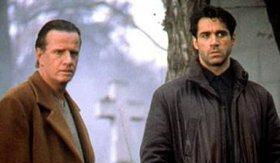Highlander: Endgame
As for being the film that officially sees the “passing of the torch” from Christopher Lambert to Adrian Paul, this film has its moments: Lambert’s legendary Connor MacLeod is portrayed as a broken man, emotionally devastated by the loss of several loved ones over the ages, and not much willing to go on with his existence, while Paul’s Duncan is relatively serene with his lot in life, trying to win back the heart of his true love (also an Immortal), while knowing that, along with his compadre Methos, that it’s best to shoulder on and try to make the most of life, eternal or not. As a result when the expected “big moment” happens, it’s the best part of the movie, as anyone with even a passing fancy in the franchise is sure to well up emotionally. Unfortunately, much of the rest of the film leaves much to be desired. The flashback scenes, always a staple of the series, are way overused here, trying to tell too much relevant information as it relates to the past (with “special guest star” and famed pro wrestler Edge getting a worthless two-minute cameo), and thus dragging the pace of the film to a crawl. What’s supposed to be a brisk 100 minute running time feels like 3 hours as a result. It’s interesting that the filmmakers chose to (wisely) use characters and locations from the first film to bring continuity, though the series was always extremely iffy with that (keep in mind the second film took place 50 years in the future, while in the third Connor actually had an adopted son). However, the BIGGEST problem is perhaps with the villain of the piece: Bruce Payne’s Jacob Kell goes for the campy, hammy aspects of the performance, and merely comes off as ridiculous. Sure, in past films Clancy Brown’s Kurrgan and Michael Ironside’s Kitana were over the top in many ways, but those actors had the larger-than-life onscreen personas to pull it off, which Payne is sadly lacking, as his unsubtle, scenery-chewing turn here ruins any kind of mood or sense of importance his character represents (funny how he’s logged more Immortal kills than Connor and Duncan COMBINED, yet Duncan had never actually heard of him). Admittedly, the final showdown is epic and well-done, unlike the anticlimactic shitfest at the end of Part 3 with Van Peebles. However, the script dances around the intriguing notion of Kell having an almost Christian ideology (as seen by the constant closeups of crosses on the back of his shoes) and ultimately goes the route of making him a Manson/Jim Jones cult leader type, complete with Immortal followers who willingly(?) allow him to take their heads so he can attain more power. Not being overly familiar with the TV series, there are certain aspects of the mythology incorporated here that I wasn’t too attuned with (like having human watchers who oversee all Immortal activity), but the main point (and problem) with the franchise is that the sequels are like multiple choice (pick your favorite follow-up to the first film and that is basically your canon; I prefer the underrated Part 2). In many ways the oldschool fans might not be happy with Lambert stepping down and Paul carrying the mantle, but keep in mind that Lambert IS getting older (and is supposedy legally blind now), and it’s clear a LOT of makeup work was done here to keep him looking the same as he did 15 years before. In the end, a sequel that serves its purpose but still suffers from many flaws…
5/10
